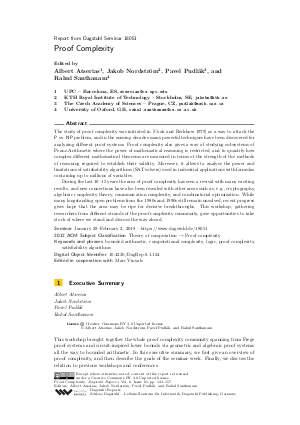Proof Complexity (Dagstuhl Seminar 18051)
Authors Albert Atserias, Jakob Nordström, Pavel Pudlák, Rahul Santhanam and all authors of the abstracts in this report
-
Part of:
Issue:
Dagstuhl Reports, Volume 8, Issue 1
Part of: Volume: Dagstuhl Reports, Volume 8
Part of: Journal: Dagstuhl Reports (DagRep) - License:
 Creative Commons Attribution 3.0 Unported license
Creative Commons Attribution 3.0 Unported license
- Publication Date: 2018-07-20
File

PDF
DagRep.8.1.124.pdf
- Filesize: 12.45 MB
- 34 pages
Document Identifiers
Subject Classification
Keywords
- bounded arithmetic
- computational complexity
- logic
- proof complexity
- satisfiability algorithms
Metrics
- Access Statistics
-
Total Accesses (updated on a weekly basis)
0Document
0Metadata
Abstract
The study of proof complexity was initiated in [Cook and Reckhow 1979] as a way to attack the P vs.NP problem, and in the ensuing decades many powerful techniques have been discovered for analyzing different proof systems. Proof complexity also gives a way of studying subsystems of Peano Arithmetic where the power of mathematical reasoning is restricted, and to quantify how complex different mathematical theorems are measured in terms of the strength of the methods of reasoning required to establish their validity. Moreover, it allows to analyse the power and limitations of satisfiability algorithms (SAT solvers) used in industrial applications with formulas containing up to millions of variables. During the last 10--15 years the area of proof complexity has seen a revival with many exciting results, and new connections have also been revealed with other areas such as, e.g., cryptography, algebraic complexity theory, communication complexity, and combinatorial optimization. While many longstanding open problems from the 1980s and 1990s still remain unsolved, recent progress gives hope that the area may be ripe for decisive breakthroughs. This workshop, gathering researchers from different strands of the proof complexity community, gave opportunities to take stock of where we stand and discuss the way ahead.
Cite As Get BibTex
Albert Atserias, Jakob Nordström, Pavel Pudlák, and Rahul Santhanam. Proof Complexity (Dagstuhl Seminar 18051). In Dagstuhl Reports, Volume 8, Issue 1, pp. 124-157, Schloss Dagstuhl – Leibniz-Zentrum für Informatik (2018)
https://doi.org/10.4230/DagRep.8.1.124
BibTex
@Article{atserias_et_al:DagRep.8.1.124,
author = {Atserias, Albert and Nordstr\"{o}m, Jakob and Pudl\'{a}k, Pavel and Santhanam, Rahul},
title = {{Proof Complexity (Dagstuhl Seminar 18051)}},
pages = {124--157},
journal = {Dagstuhl Reports},
ISSN = {2192-5283},
year = {2018},
volume = {8},
number = {1},
editor = {Atserias, Albert and Nordstr\"{o}m, Jakob and Pudl\'{a}k, Pavel and Santhanam, Rahul},
publisher = {Schloss Dagstuhl -- Leibniz-Zentrum f{\"u}r Informatik},
address = {Dagstuhl, Germany},
URL = {https://drops.dagstuhl.de/entities/document/10.4230/DagRep.8.1.124},
URN = {urn:nbn:de:0030-drops-92864},
doi = {10.4230/DagRep.8.1.124},
annote = {Keywords: bounded arithmetic, computational complexity, logic, proof complexity, satisfiability algorithms}
}
